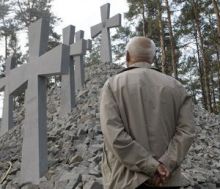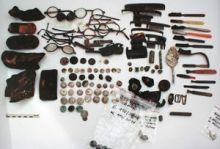The climax of the visit was at Bykivnia forest near Kyiv. The Polish and Ukrainian presidents opened there a Polish cemetery of the Katyn tragedy victims. It is the fourth cemetery to the victims of this tragedy whereas the Ukrainian victims of Bykivnia are still commemorated by towels on trees.
The information about opening the cemetery was spread by the Polish media at the end of the past month. One more event partially contributed to the resonance around it: the opening of the exhibit called “The Polish Military Cemetery in Kyiv-Bykivnia” in front of the president’s palace in Warsaw. By the way, when opening this exhibit Bronislav Komorowski urged the Ukrainians to overcome slops and ignorance about their communist past and integrate into the Western world basing on the historical truth. Do we have to be urged to do this by a president of another country? Don’t we have our heads?
Actually, this is the evidence of the way that Poland has gone over the past two decades and that Ukraine could not.
“It is true not about the whole Ukraine,” a historian from Lviv Leonid Zashkilniak opines. “Komorowski’s words mainly concern the eastern and southern parts of Ukraine that have specific mentality. In virtue of circumstances and propaganda people there are still influenced by the Soviet-Donetsk ideology. The reason for this is that over 20 years of independence our authorities and governing elites tried to maneuver [between Europe and Russia. – Ed.]. This was needed not to deny the ‘beautiful’ past of the Soviet Union and, at the same time, approach the European prospects.”
As for historical memory, Poland is consistent regardless of rotation of authorities, unlike Ukraine.
“It is a significant event,” the representative of the Party of Regions Volodymyr Zubanov commented. “It proves that we remember history. If the president can find time to deal with this issue it means that our authorities are constructive. Besides, it is a friendly step towards our neighbors as we have a common history.”
However, according to the representative of authority, urging Ukrainian people to something is not very polite. “Viktor Yanukovych also could have urged the Polish people to get rid of their slops, however, he did not do it,” Zubanov says. “It proves his politeness. I have never heard that the Ukrainian president advised anything to anybody whereas the Russian and Polish presidents constantly advise us something. Ukraine is a powerful country with rich history. We can also advise. We know our situation better.”
“We are developing a democratic society, which is why any views can exist,” the politician continued. “A part of our people support communists, a part of them support nationalists. Everyone has their heroes. The key thing is that the level of radicalism does not go through the roof. How can we get rid of different slops? With the time the history will crystallize the greatest figures that will remain in people’s memory. The time will come and we’ll get rid of communist and nationalist slops.”
Yes, we have already learnt how to “correctly” interpret the European Charter for Regional and Minority Languages and the concept of the “democratic society where any views have the right to exist.” Multi-vector policy again. The reputation of our authorities in Europe leaves a lot to be desired, that is why to keep good relations with Poland and the EU it is ready to concede on some humanitarian issues. We several times got the evidence of the real attitude of our authorities towards Holodomor, the language, and other significant issues. For instance, the Ukrainian Institute of National Memory has declared that opening the Polish cemetery in Bykivnia is “promoting the Polish policy eastwards.” Though they emphasized that it is commentator’s personal opinion and not the one of the institute, it does not really change anything. It has the spirit of the “cold war.”
Instead, Leonid Zashkilniak does not see anything negative in Komorowski’s words. “It is a normal thing since the European ideas have always come to Ukraine via Poland,” the historian says. “The declarations about ‘the danger of the Polish influence’ come from our north-eastern neighbor that wants to keep Ukraine in its sphere of influence. That is why thinking with old Soviet concepts that Poland wants to increase its influence in Ukraine is the tribute to the Soviet patriotism.”
Despite that few people believe that our authorities have sincere intentions, the creation of the Polish cemetery was financed not only by Poland but Ukraine as well. However, will the Ukrainian victims of the Bykivnia tragedy be ever commemorated?
“THE COMMUNISTS ARE URGING TO ‘GIVE THE COUNTRY BACK TO PEOPLE,’ THE COUNTRY THAT EXISTED UNDER THEIR REGIME. IT WILL NEVER HAPPEN…”
Stanislav KULCHYTSKY, Ph.D. in history, professor, deputy director for scientific work at the Institute of History of Ukraine:
“In 1991 the communist economic regime collapsed since it had historically exhausted itself and did not have any possibilities to continue. At the same time the political perestroika was in progress – Gorbachev delegated all powers to the soviets and the Communist Party of the Soviet Union was left at the side of the road. As a result, everything disappeared since the regime and the state relied on the party. However, the mentality of people of the third Soviet generation remained. Over these three generations certain stereotypes have appeared since the last decade of the communist rule relied not on the terror (as it had been when it had been created) but on propaganda.
“The main feature of soviet people was its dependence on the state. This state paternalism, which is the brightest attribute of the communist regime, deprives people of their independence. Under the communist rule the dependence on the state developed to the extent that made people politically incapable.
“A lot of information about this can be found at the Institute of Sociology at the National Academy of Sciences of Ukraine. In the polls carried out there over 20 years people were asked if they were members of any NGO or party. The answer was always nearly the same: over 80 percent of people were not members of any organizations.
“We do not have any political civil society. The economic background of this society, the middle class is appearing, but very slowly. This situation is conditioned by absolutely conscious policy of oligarchs strangling the middle class and depriving it of possibilities to develop. This is what is in people’s heads though the communist regime collapsed long time ago. Since the oligarchic political forces do not have any program of reforms the situation in our country is constantly aggravating and there is a phenomenon that the Communist Party, which is a political rudiment of the previous regime, is gaining power.
“The communists are urging to ‘give the country back to people,’ the country that existed under their rule. It will never happen and people understand it. However, a part of people still cannot get rid of their communist ideas.
“The declarations from Poland are the evidence that Ukraine is extremely significant for its security and success. It is very important for Poland that Ukraine is in Europe.
“We do not have any political contradictions. The problem of the east-Polish and west-Ukrainian border, which used to keep both societies on their toes from 1918 to 1945, was exhausted. Now there is hardly any nostalgia for former Poland on our modern western territories. It is important that Ukraine and Poland cooperate in economy and have a political harmony. It will be only possible when Ukraine is in Europe.
“Today it is very difficult to get a full-fledged membership in the EU. There is the historical experience of new countries entering the EU when they were not ready for the situation that exists in main European countries.
“Ukraine is not ready to be in Europe because of its communist heritage. However, we have to continue moving in this direction. The Poles are our main allies in this.
“Spreading the Polish influence in Ukraine lies in the fact that every year the number of people going to work in Poland is augmenting. There is the following economic principle: the Poles are going to work to prosperous west-European countries and the places they leave are taken by people from other countries. Some of them settle down in Poland. It mainly concerns the people from western regions of Ukraine. The people from eastern regions go to work in Russia since they are constantly threatened by unemployment because of our imperfect economy. So, both Poland and Russia have their economic and cultural influence in Ukraine.
“COMMEMORATING THE GRAVES OF POLISH PEOPLE IS OUR NATIONAL DUTY”
Doctor Slawomir KALBARCZYK, head of the department for scientific research at the Institute of National Memory, Warsaw:
“Canadian historians insist that geography has influenced Canada’s fate more than history. Quite the opposite can be said about Poland. The Polish history has always been very rich in events. Lots of things have always happened here. The stormy history of our country, which did not lack tragic events such as its division or World War II, is very important for the Poles. The historical memory in Poland is very strong; however, certainly not all the Polish people are equally interested in history. Various facts are the evidence that this interest is great. Suffice it to mention the mass viewing of the film about Katyn by Andrzej Wajda.
“One of the reasons for strong feelings history provokes in Poland is that historical events influence our today’s life. The best example of this is the Katyn tragedy that has not been resolved yet. We are looking forward to hearing the position of the European Court on Human Rights in Strasbourg. On April 16, 2012 it examined Poland’s suit and acknowledged that Russia had violated the European Convention on Human Rights when investigating the Katyn crime. One of the conclusions of the court is that the Katyn crime can be treated as a military one and the limitation does not extend on it. It contradicts the position of the Russian authorities trying to interpret the Katyn tragedy as a criminal offense with an expired limitation. Obviously, Katyn is one of the examples. It should be also mentioned that the grave sites of many victims of the communist regime in Poland are still unknown and the question of criminal liability of the communist regime in our country is still open.
“Opening the cemetery in Bykivnia is highly important for Poland. Thus we demonstrate that paying homage to the people who gave their lives for showing loyalty to Poland is very important for us. Commemorating their graves is our national duty. The Poles will certainly attend the place where the obvious evidence of the murder of our compatriots was found. Don’t forget that we have to pay our national duty in Ukraine and in Belarus: find and mark the graves of those who were executed by the Soviet police in 1940 in the prisons of Kherson, Kharkiv and Minsk.”









